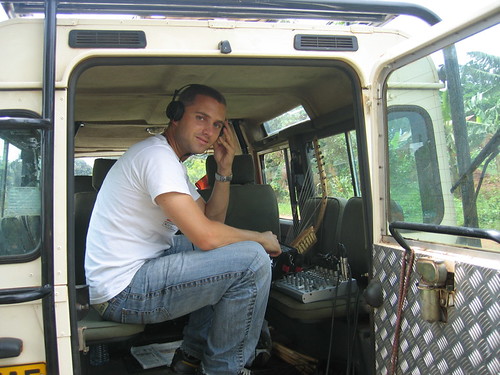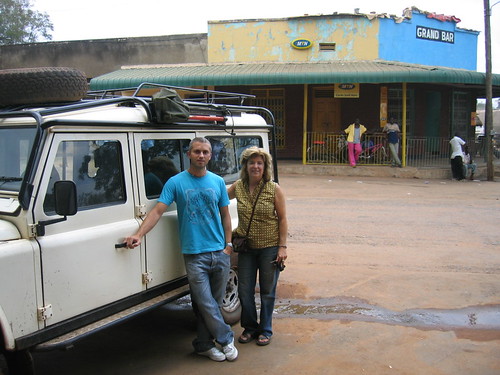“World Routes is on a mission to travel to the far-flung corners of the planet to document and, in its own small way, preserve endangered musical traditions.
In the past ten years World Routes’ producers and sound engineers, along with Lucy Duran and a team of guest presenters, have left the (relative) comfort of Broadcasting House in search of real roots traditions. To date, the programme has visited around 60 countries, including 15 in Africa, 16 in Asia, and 9 in the Americas.”
On Monday 16th January 2012, World Routes: On the Road was released.

James Parkin is Senior Producer at Radio 3 and Producer of its flagship world music show World Routes which is enjoyed by around 100,000 listeners around the UK and millions more around the globe. Just before Christmas, Buzz Trips caught up with James to find out about his experiences on the road.
Buzz Trips: How did you first become interested in World Music?
James: By accident! I’ve always had pretty big ears, and enjoyed listening to all sorts of music. I was an organ scholar at Oxford, and collected David Bowie albums as a teenager! But in 2001, I was drafted into the BBC’s New and Specialist Music Unit at Radio 3 and was promptly sent to Dakar, Senegal to record the newly reformed Orchestra Baobab. I was hooked from that moment on.
Why is it that some musical traditions are becoming endangered, and which country’s music do you think is most at risk?
James: It’s all about globalisation. Roads are built, satellite TV is installed and local traditions cease to be important and become unfashionable. It happened in the first world along time ago, and now the developing world is catching up. As for which country, in my experience China will have big problems with its traditional culture. It’s growing so fast that just in a matter of years, whole traditions have crumbled away. Whole cities have seen old neighbourhoods destroyed, and what’s left of the music is often heavily stylised by central government.
Why is it so important to preserve these traditions?
James: In many societies, these traditions are the oral histories of the area. They document genealogy, they advise young people, and they bring communities together. Without them, everyone would be the same.
Your travels have taken you to some of the most remote places on the globe. How do you discover musicians from these far flung corners?
James: Local fixers, word of mouth, and occasionally, we contact the local radio station and ask them to put a call out for this musician or that musician. Would they meet us at the junction between this village or that village by the giant baobab tree? That sort of thing…
Are there places where it’s just too dangerous to travel and whose music you have not managed to capture as a result?
James: Yes, many. The BBC will report from anywhere to bring its global audience news stories, but, quite rightly, but will not put us at unnecessary risk to record folk music! We’d love to go to Iraq and Afghanistan, for example. Luckily last year we got to go to Syria before the most recent trouble started. Having said that, we do try to get to as many places as possible and manage the risk very professionally. Next year, for example, will see World Routes’ debut in Colombia – the safer parts, at least!
What has been your most frightening experience on the road?
James: For the BBC journalists and presenters who travel to the more dangerous parts of the world, there is a training course run by the corporation’s High Risk Team. It’s called the Hostile Environment course. I’ll never forget the introduction to this intense, residential week: an ex-SAS soldier warned us sternly that if anyone in the room was going to be involved in an incident abroad that would lead to injury or death, it would most likely be a road traffic accident. And that’s my experience: travelling through Venezuela, the wheel of an approaching lorry sheared off and went through our front windscreen. My BBC team were, somehow, saved. Our local driver and guide were not so lucky.
You’ve had some truly unique recording venues while on tour with World Routes; can you tell us some of the most unusual places you’ve recorded artists?
James: How long have you got?! A quarry in southwest China. A mountain meadow in Svaneti, Georgia. A Turkish bath in Istanbul. A golf club (the golf club) in Pyongyang, North Korea. The source of the Nile in Uganda. A volcano crater in Cape Verde…..
Moving sound and recording equipment as well as engineers, producers and presenter around the globe must be a logistics nightmare. What has the most difficult journey you have had to make?
James: There have been many, but Cape Verde certainly kept me on my toes! Of the 9 inhabited islands, we embarked on a mad, 2-week adventure, taking in 6 of them. We encountered closed airports and long delays. We had to hitch a lift on a fishing trawler after both commercial ferries sank. We had to charter a plane when the only flight that week was cancelled. And we had to charter a speed boat when we missed a ferry (which we missed because of a….delayed flight!). With all this in mind, we were travelling with our own travel agent! And we couldn’t have done it without him.
Michel – Homi di Fora by Nascente Music
How do you find your local ‘fixers’ and what brief do you give them?
James: It’s all about contacts. We’ve worked with local journalists, BBC journalists (our fixer in Georgia was the then BBC Moscow correspondent), DJs, writers, travel agents, academics (in Uganda we were lucky enough to work with one of the world’s leading ethnomusicologists on Uganda music), musicians (our guide in Peru is the drummer with one of Peru’s biggest bands), diplomats…and of course, there are such things as professional fixers! The brief is easy, and it’s usually the same: find us the best traditional musicians in your country and get us and our equipment to them!

Which recording are you most proud of, and why?
James: Again, there are so many, but from a personal point of view, I love the Toumani Diabate track on the compilation. On that particular trip I had no engineer: it was just me and a bag of microphones. Toumani took me and Lucy Duran (the presenter, pictured with James above) to his studio in Bamako (in Mali), I set up the microphones, and off he went. It was very hot and sticky, but the music was magical, and the atmosphere magical. Here was this great star of world music, but there was no entourage, just us and the microphones. A traditional field recording!
Toumani Diabate – Musu Maramba by Nascente Music
You often talk about the emotion that the music you record evokes in its listeners. Which piece of music moved you most?
James: Ilham Al Madfai and his song Baghdad rarely leaves a dry eye in the house! I’ve heard Ilham play this song so many times and it never fails to move me: he represents a broken country with a strong people who love Iraq, and in the case of this song, the beautiful Baghdad. This is a love song for a city, and it’s a city that has been largely destroyed. The recording of the song on this compilation was made in Jordan where Ilham and his family have been living as exiles for many years. And now Saddam has gone, they still can’t return. Recording Ilham perform this song so close to Baghdad – and yet so far – was moving indeed.
If there is one country you have visited with World Routes whose music, people and landscapes you could see yourself living with, which would it be?
James: Brazil. But I have to say that because I’m married to a Brazilian! Although the music, the food, the drink, the beaches, the Amazon, the climate would make it pretty irresistible whatever one’s marital set-up…
So, James, do you have the best job in the world?
James: I love it and there’s not a day when I don’t remember how lucky I am. I do occasionally need reminding, however, when I’m checking in for the 14th flight in 15 days. Or embarking on another 10 hour drive in India. Or explaining to the 200th border official that yes, we are visiting his country to record folk music…..

Featuring 30 tracks from artists recorded in 18 countries, World Routes: On the Road includes Grammy Award winning kora player Toumani Diabate recorded at his home in Bamako; the Brazilian roots singer Siba recorded in a cow shed in North East Brazil and the Cape Verdean star Tito Paris recorded in a hotel basement, as well as many unknown artists who never leave their villages except through recordings like these – artists who sing songs that haven’t changed in 1000s of years.
Andrea (Andy) Montgomery is a freelance travel writer and co-owner of Buzz Trips and The Real Tenerife series of travel websites. Published in The Telegraph, The Independent, Wexas Traveller, Thomas Cook Travel Magazine, EasyJet Traveller Magazine, you can read her latest content on Google+

Wow! This is fascinating. Can we listen to this program outside of the UK?? He is like the Alan Lomax of World Music!
Isn’t it!! What an incredibly interesting guy and what a brilliant job he’s got – give or take the occasional near-death incident. You can listen to it on the World Service and on iPlayer via the BBC Radio 3 site here